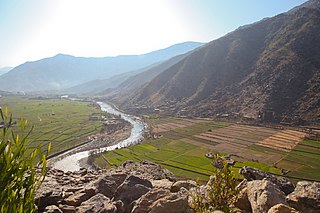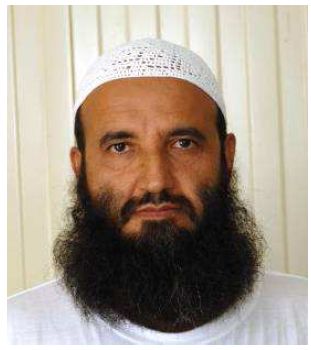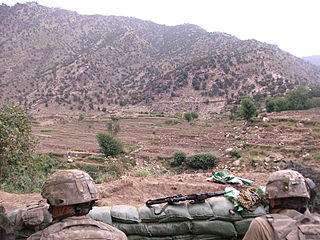
Afghanistan, officially the Islamic Emirate of Afghanistan, is a landlocked country located at the crossroads of Central Asia and South Asia. It is bordered by Pakistan to the east and south, Iran to the west, Turkmenistan to the northwest, Uzbekistan to the north, Tajikistan to the northeast, and China to the northeast and east. Occupying 652,864 square kilometers (252,072 sq mi) of land, the country is predominantly mountainous with plains in the north and the southwest, which are separated by the Hindu Kush mountain range. Kabul is the country's capital and largest city. According to the World Population review, as of 2023, Afghanistan's population is 43 million. The National Statistics Information Authority of Afghanistan estimated the population to be 32.9 million as of 2020.

Hamid Karzai is an Afghan politician who served as the fourth president of Afghanistan from July 2002 to September 2014, including as the first elected president of the Islamic Republic of Afghanistan from December 2004 to September 2014. He previously served as Chairman of the Afghan Interim Administration from December 2001 to July 2002. He is the chief (khān) of the Popalzai Durrani tribe of Pashtuns in Kandahar Province.

The Durand Line, also known as the Afghanistan–Pakistan border, is a 2,640-kilometre (1,640 mi) international border between Afghanistan and Pakistan in South Asia. The western end runs to the border with Iran and the eastern end to the border with China.

Ahmed Wali Karzai was an Afghan politician who served as Chairman of the Kandahar Provincial Council from 2005 until his death. He was the younger paternal half-brother of former Afghan President Hamid Karzai and an elder of the Popalzai tribe. Wali Karzai formerly lived in the United States, where he managed a restaurant owned by his family. He returned to Afghanistan following the removal of the Taliban government in late 2001. He has been accused of political corruption and was allegedly on the CIA payroll. He was assassinated by one of his close bodyguards, Sardar Mohammad, on 12 July 2011.

Nuristan, also spelled as Nurestan or Nooristan, is one of the 34 provinces of Afghanistan, located in the eastern part of the country. It is divided into seven districts and is Afghanistan's least populous province, with a population of around 167,000. Parun serves as the provincial capital. Nuristan is bordered on the south by Laghman and Kunar provinces, on the north by Badakhshan province, on the west by Panjshir province, and on the east by Pakistan.

Kunar is one of the 34 provinces of Afghanistan, located in the northeastern part of the country. Its capital is Asadabad. Its population is estimated to be 508,224. Kunar's major political groups include Wahhabis or Ahl-e- Hadith, Nazhat-e Hambastagi Milli, Hezb-e Afghanistan Naween, Hezb-e Islami Gulbuddin.

Awal Gul was a citizen of Afghanistan who died in extrajudicial detention in the United States Guantanamo Bay detention camps in Cuba after nine years of imprisonment without charge.
During the War in Afghanistan, according to the Costs of War Project the war killed 176,000 people in Afghanistan: 46,319 civilians, 69,095 military and police and at least 52,893 opposition fighters. However, the death toll is possibly higher due to unaccounted deaths by "disease, loss of access to food, water, infrastructure, and/or other indirect consequences of the war." According to the Uppsala Conflict Data Program, the conflict killed 212,191 people. The Cost of War project estimated in 2015 that the number who have died through indirect causes related to the war may be as high as 360,000 additional people based on a ratio of indirect to direct deaths in contemporary conflicts.
Taj Mohammad Wardak is an Afghan politician from the National Independence Party of Afghanistan. An ethnic Pashtun, he spent some of the period of the Taliban's administration in the United States of America, and became an American citizen.

Badr Hari is a Moroccan-Dutch professional kickboxer. He is a former K-1 Heavyweight World Champion (2007–2008), It's Showtime Heavyweight World Champion (2009–2010) and K-1 World Grand Prix 2008 and 2009 finalist. Known for his aggressive and explosive fighting style, Hari is widely considered one of the greatest kickboxers of all time.
New Kabul Bank is a bank in Afghanistan that has its main branch in the capital city of Kabul. It was established in 2004 as the Kabul Bank, the first private bank in Afghanistan. After corruption and scandals it was re-established in 2011 as the New Kabul Bank.

The Battle of Wanat took place on July 13, 2008, when around 200 Taliban insurgents attacked American troops stationed near Quam, in the Waygal district of Afghanistan's far eastern Nuristan province. The distant position was primarily defended by United States Army soldiers with 2nd Platoon, Chosen Company, 2nd Battalion, 503rd Infantry Regiment (Airborne), 173rd Airborne Brigade Combat Team.

Smári McCarthy is an Icelandic-Irish politician, innovator and information activist known for his work relating to direct democracy, transparency and privacy.

The Battle of Kamdesh took place during the war in Afghanistan. It occurred on October 3, 2009, when a force of 300 Taliban assaulted the American Combat Outpost ("COP") Keating near the town of Kamdesh in Nuristan Province in eastern Afghanistan. The attack was the bloodiest battle for US forces since the Battle of Wanat in July 2008, which occurred 20 miles (32 km) away from Kamdesh. The attack on COP Keating resulted in 8 Americans killed and 27 wounded while the Taliban suffered 150–200 killed.

On 5 August 2010, ten members of International Assistance Mission (IAM) Nuristan Eye Camp team were killed in Kuran wa Munjan District of Badakhshan Province in Afghanistan. The team was attacked as it was returning from Nuristan to Kabul. One team member was spared while the rest of the team were killed immediately. Those killed were six Americans, two Afghans, one Briton and one German.
Events from the year 2011 in Afghanistan.

Arshad Sami Khan was a Pakistani diplomat, civil servant and fighter pilot who at peak of his career attained the highest rank of Federal Secretary. He started his career as a Pakistan Air Force fighter pilot and later served three presidents of Pakistan as their aide-de-camp (ADC) and later went on to the Ministry of Foreign Affairs where he served three presidents and four prime ministers as chief of protocol. He was later appointed as a diplomatic ambassador of Pakistan to 14 countries. This was followed by his appointment as the first commissioner general of Pakistan. He was also Federal Secretary of Culture and retired as a top BPS-22 grade bureaucratic officer. He was also the father of singer and music composer Adnan Sami.














